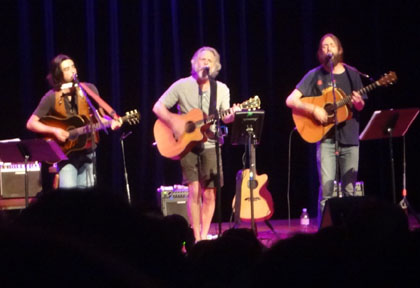
Three men from three different generations are playing acoustic guitars in an old barn. A seated audience listens intently as these balladeers trade lead vocals and instrumental flourishes. All the while an early summer breeze occasionally stirs some feathers from the rafters, sending them floating downward to glow briefly in the lights before alighting on the edge of the stage. As the last notes of their song subside the crowd claps and hollers in appreciation and the smiling musicians turn to one another tuning their guitars, discussing their next song.
While this may describe countless hoedowns and rambles that have occurred throughout the history of American acoustic music, this scene took place just this week in Boulder, CO on June 4, 2012 at Chautauqua Auditorium.
Bob Weir, Chris Robinson and Jackie Greene have been touring the country as an acoustic trio this spring, performing in various theaters and outdoor stages. At Chautauqua they found themselves playing in a very large, 120 year-old wooden barn. It was constructed in 1898 during the hey-day of the Chauatauqua movement in America and its original purpose was for public lectures and unamplified music. One tradition at Chautauqua is for people without tickets to put down a blanket on the lawn just outside the barn to listen. Many families with children continued that tradition on this evening; listening intently to the trio’s music spill through the wooden slats of the barn and out into the twilight foothills of the Rocky Mountains. Although this was the final date of their tour, this penultimate performance properly captured the musical continuum that these performers are a part of.
From the opening notes of their first song, “New Speedway Boogie,” there was a distinct feeling that we were witnessing something that was at once rare and timeless; honest acoustic music and the high lonesome sound of voices harmonizing, performed to a rapt audience. The performers tipped their hat to this venue and the setting with their second song, “I Ain’t Broke, But I’m Badly Bent,” a bluegrass standard that most Deadheads know from Old and in the Way recordings.
And with those two songs the band also signaled this was going to be a night heavy on Garcia’s folk-influenced tunes. Beyond some of the Garcia standards that one would expect (“Bird Song,” “Loser,” “Sugaree,” “Peggy-O”) Bob Weir took a huge risk and performed “The Days Between” solo. That risk paid off as his tender and heartfelt rendition of the song brought a rousing ovation from the audience. And lyrics about the fragility of life seemed to hang in the air of the barn as the show continued.
The band clearly has a great affection for one another and took turns joking with one another and commenting on the wonderful setting they were playing in. Before Greene started his two song solo set he commented that each member of the band was going to perform solo in order of their age and Weir hobbled off the stage as if walking under the assistance of a cane. Moments later, after Jackie’s first solo song, Weir returned to the stage delivering an oxygen tank on wheels to the 32 year old, ‘just in case.’
While Chris Robinson and Bob Weir are clearly accomplished performers, each with legions of their own fans, Jackie Greene was the performer whose talent shown brightest on this night. His vocal talents rival many of the modern professional bluegrass performers with its range and emotive qualities and his guitar playing simply carried their performance to new highs. His guitar flourishes during “Loser” seemed to echo the ‘shine’ of the queen of diamonds and his slide guitar work on “West LA Fadeaway” was a skilled balance of precise boisterousness. However, what could be described as the highlight of the evening was when Greene wielded his banjo during a very tender reading of “Bird Song.” He played the lead melody with so much confident sweetness the crowd swooned when the descending line was sounded before each new verse. I know it sounds cliche to say it but ‘Garcia would have been proud!’
While the performance was not technically perfect (there were some missed cues and lyrics) the fact that the audience sat for most of the show made for a unique situation for Weir, Robinson and Greene. They were the entire focus of their audience and ovations seemed more heartfelt and honest. As opposed to seeing this group in a theater where a party atmosphere encourages dancing and carousing, this setting really put the performers front and center with no other distractions. While this tour of shows from this particular trio was already seen by many as a special event, this particular performance stood out purely because of the venue. Unique, special, rare… these words are used so commonly that the value of their meaning is debased. However, in this case those who were in attendance know that those words are most appropriate for what they saw.
And yet, there is something so timeless about seeing music played on acoustic instruments in an old barn, that one can not help but recognize that they are participating in a age-old ritual that will continue as long as humans yearn to learn and love and grow.


No Comments comments associated with this post